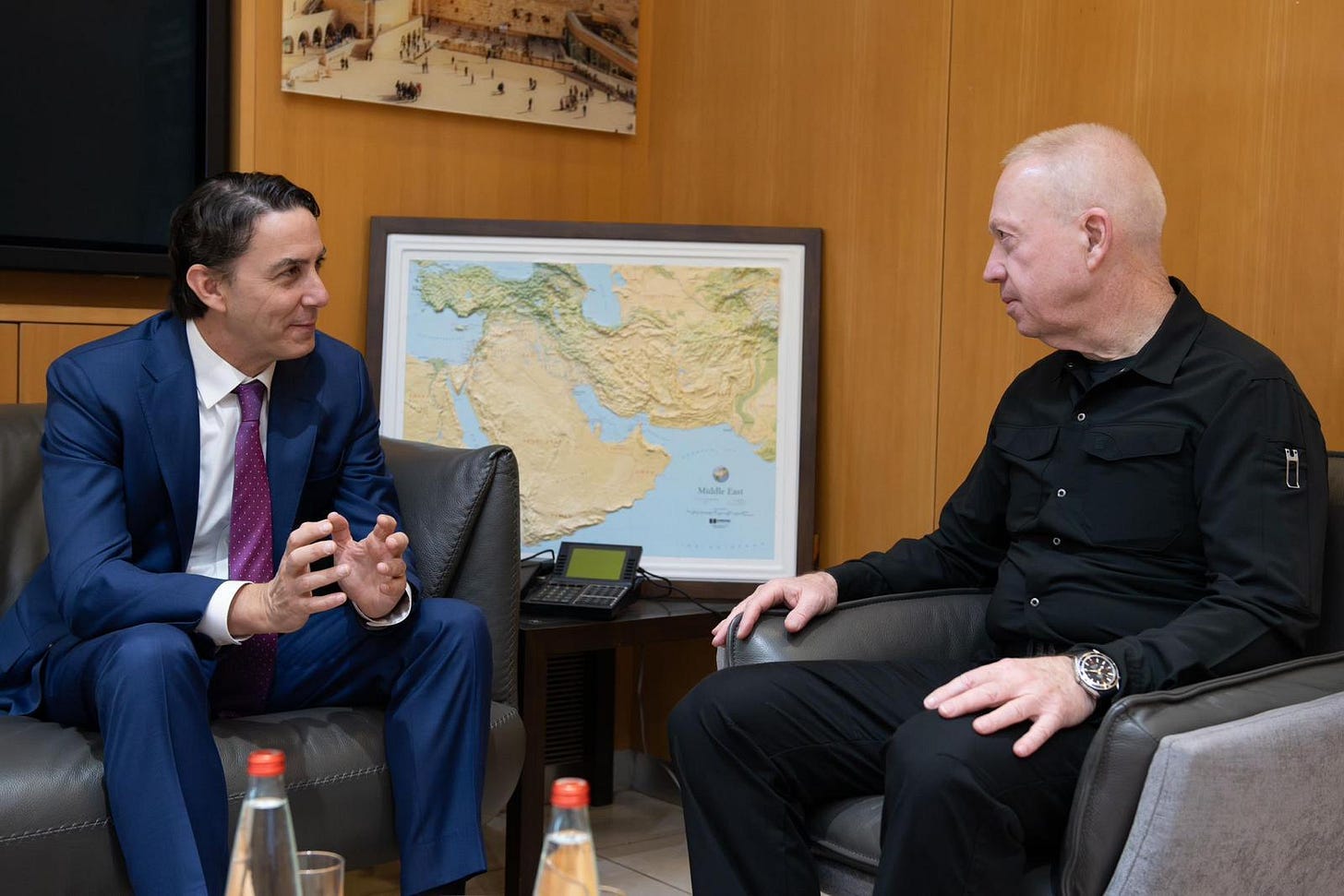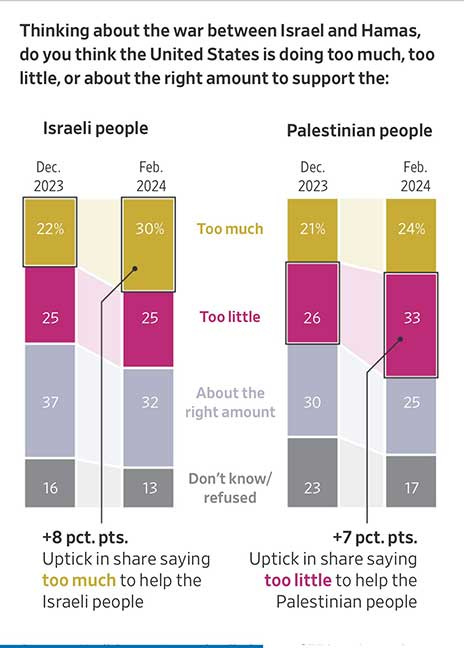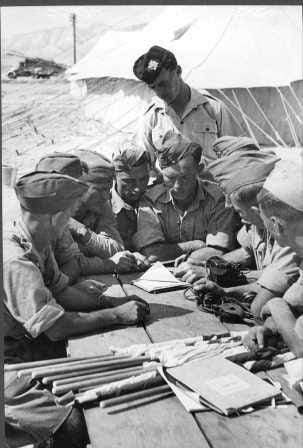DAY 151 OF THE GAZA WAR: Massive Missile Attacks By Hezbollah, Gantz in Washington, Temple Mount
Tel Aviv Diary,March 5, 2024
Missile and rocket attacks continued today along the Northern border. Two rockets struck the largely empty town of Kiryat Shmona, damaging a home and a clothing store. Tonight, Hezbollah fired a barrage of 30 rockets at targets in the North.
Meanwhile, U.S. mediator Amos Hochstein held a meeting with Defense Minister Gallant, who conveyed to Hochstein that while Israel is dedicated to seeking a diplomatic resolution, it is nearing a juncture where it might need to consider military action
.
This morning, an Air Force F-16 downed a drone launched from Syria. Here is a view from the cockpit.
GANTZ IN WASHINGTON
Benny Gantz’s meeting with Secretary of State Blinken today resulted in feedback echoing the sentiments he received from all the other officials — i.e., the American government is disappointed with Israel's handling of the humanitarian crisis in Gaza. The U.S. has consistently stated that its support for Israel is contingent on Israel’s management of humanitarian aid. Despite allowing trucks in, Israel has done little else to successfully distribute aid in Gaza, other than complain about Hamas commandeering supplies meant to benefit the civilian population.
Once again, our failure to develop a post-conflict strategy for Gaza is beginning to have repercussions in many areas. Furthermore, most Israelis are ignoring the situation unraveling in Gaza, and we do so at our own peril. While Hamas is responsible for instigating this catastrophe, solely blaming them does not solve our problems. Hamas does not care about the well-being of Gaza’s civilians, but we have certain legal obligations to ensure they do not starve, or lack basic medical care. The Americans are now planing a potential sealift operation to deliver supplies into Gaza.
Gantz’s office released this statement summarizing his visit:
The chairman of the National Unity Camp, Minister Benny Gantz, has just concluded his state visit to the USA. During the day, Gantz met with Secretary of State Antony Blinken, Secretary of Defense Lloyd Austin, Senate Majority Leader Senator Chuck Schumer, and the Democratic Minority Leader in the House of Representatives, Hakeem Jeffries. Gantz also appeared before the Senate Foreign Relations Committee. Gantz is currently on his way to Britain for a one-day state visit and will return to Israel on Wednesday night.
GAZA
Most of the effort in Gaza was in the Hemed neighborhood of Khan Younis. Here is how the IDF Spokesman described today’s actions as follows:
Division 98 forces continued their encirclement of the “Hemed” neighborhood and raids on terror infrastructures in the area. Commando unit fighters raided Hamas terror infrastructures in the neighborhood and have found many weapons. Fighters from the combat team of Brigade 7 continue to operate as part of the effort to evacuate residents from the combat zone, arresting dozens of terrorists from Hamas and the PIJ organizations in the last day, who tried to escape under the cover of the civilian population in the neighborhood.
The combat team of the Paratroopers Brigade continues to operate in the center of the Gaza Strip and eliminated about twenty terrorists during the last day, using sniper fire, tank shells, and remotely piloted aircraft. In one of the attacks, in a cooperation of the Brigade's fire complex, Brigade intelligence, and the Air Force, a circle was closed on a terrorist, and through the guidance of the Brigade's fire complex, he was eliminated in a precise strike.
During an operation in the Beit Hanoun area, the fire complex of the Northern Brigade identified a terrorist cell operating a drone during the forces' activity in the area. After identification, a fighter jet attacked and eliminated the cell.
The Air Force continues to actively engage Hamas terror organization targets throughout the Gaza Strip, and over the course of the last day, over 50 targets of the organization were attacked, including: launch positions, weapon storage facilities, tunnel shafts, and additional military infrastructures.
The Army also demolished the largest tunnel discovered to date in Gaza.
HOSTAGES
At day 151, the prospects of reaching an agreement to release the hostages has worsened. Today, both President Biden and Secretary of State Blinken stated that Hamas now bears responsibility. Hamas appears to have returned to its initial demands, calling for an end to the war and a complete withdrawal of Israeli troops from Gaza. Rather than pursuing a resolution before Ramadan, it appears Hamas seeks to carry out significant attacks in the West Bank during the month of Ramadan. However, I need to clarify … I used the word “appears”, since in reality it remains unclear where things stand. I cannot comprehend the anguish the hostage families are suffering. It is simply unimaginable.
TEMPLE MOUNT
Prime Minister Netanyahu decided to disregard the recommendation of Minister of National Security Ben-Gvir to restrict Arab Israeli’s access to the Temple Mount during Ramadan. Both the Security Service and the Army strongly opposed Ben-Gvir’s plan, arguing it would needlessly provoke Arab Israelis, who have not engaged in any violence, or other anti-Israel activity throughout the war, despite the fact that some have relatives in Gaza. Ben-Gvir has been trying, without success, to create additional tensions between Jews and Arabs inside Israel. Thankfully, Netanyahu made the prudent decision.
MERON REPORT
The national commission of inquiry into the tragic stampede at Mt. Meron, which resulted in the deaths of 45 worshipers on April 30, 2021, is scheduled to release its report tomorrow. The report is expected to be highly critical of Prime Minister Netanyahu, the Police Commissioner, and current Speaker of the Knesset Amir Ohana, who was Minister of Internal Security at the time of this catastrophic incident.
AMERICAN PUBLIC OPINION
A survey by the Wall Street Journal highlights a drop in support for Israel.
BUSINESS
The digital health startup Healthee, which assists insured individuals in the United States to understand their medical rights, has raised $32 million in Series A funding. The round was co-led by Fin Capital, Galil Capital Partners Growth Fund — Galil+, and Group 11, led by investor Dovi Frances, who also led the previous round.
The fundraising round was joined by TriNet, a company traded on the New York Stock Exchange, which offers software services for human resources in organizations. TriNet invested in the company after signing a strategic collaboration with Healthee. This new investment brings the total capital raised by the company to $58 million since its inception. The company initiated this fundraising round while its CEO, Guy Benjamin, returned to Israel from the USA to serve in the reserves, with the entrepreneurs conducting discussions with investors and signing contracts alongside their operational activities.
–––––∞–––––∞–––––∞–––––∞–––––∞–––––∞–––––∞–––––
A PIECE OF HISTORY
Palestine During World War II
World War II erupted shortly after the issuance of the White Paper. However, it soon became evident that the British and the Jews of Palestine shared a common enemy. Four days before the German invasion of Poland, Chaim Weizmann, leader of the World Zionist Organization, wrote to British Prime Minister Chamberlain stating,
The Jewish Agency has recently had differences in the political field with the Mandatory Power. We would like these differences to give way to the greater and more pressing necessities of the time.
Once the war commenced, the Yishuv mobilized all of its resources to aid the British war effort. The amount of cultivated land, for increased production of food, expanded by 70%. All factories in Palestine began manufacturing war-related items. Everything from tank treads to uniforms was produced in the factories of Jewish Palestine. During the war, the number of factories tripled, and by 1945, 63% of the working population of Jewish Palestine was engaged in producing war products.
At the outset of WWII, the Va’ad Leumi (National Committee) announced it would register people for national service. 136,000 signed up in the first five days. The Jewish Agency sought to organize Jewish soldiers into a special unit, similar to what happened during World War I. British officials in the Middle East opposed the idea, and temporarily blocked the initiative.
However, when Winston Churchill replaced Chamberlain as Prime Minister in 1940, British policy began to change. Churchill was open to the idea and wrote to Colonial Secretary Lord Lloyd, asserting,
The cruel penalties imposed by your predecessor upon the Jews of Palestine for arming have made it necessary to tie up needless forces for their protection. Pray let me know exactly what weapons the Jews have for self-defense.
Churchill met with Weizmann for lunch on September 6, 1940, and assured Weizmann of his support for the project to start a Jewish army. After the meeting, Churchill sent a memorandum ordering the recruitment of as many Palestinian Jews as possible to form Jewish battalions. Since the Colonial Office insisted there be an equal number of Jews and Arabs in the units, and more Jews than Arabs were expected to volunteer, the surplus Jewish volunteers were to be sent to Egypt for regular military training. Lord Lloyd died suddenly and was replaced by Lord Moyne, who, along with British officials in the Middle East, succeeded in delaying the plan. Despite this, Jews volunteered, and by August 1942, there were 18,000 Jews in Jewish battalions as part of the British Army. In total, it is estimated that 30,000 Jews became part of Jewish forces serving in nearly all branches of the British army during the war.
During the darkest days of the war, when it appeared that German forces commanded by General Rommel might break through Egypt, the Haganah developed what was called “the Carmel Plan”. This was a strategy to defend a region in the Carmel Mountains that would become a refuge for all Jews of Palestine. Additionally, during this time, the British sought help from the Haganah and its Palmach branch to prepare for the British invasion of Syria. The Palmach carried out reconnaissance operations, one of the mission’s leaders being Moshe Dayan, who lost an eye during an encounter with enemy forces.
The experience of so many Jews from Palestine in the British army proved invaluable for defending Israel in the War of Independence.
Yesterdays Radio Progam









Just a great, great article and compilation of data. I like the charts that show Israeli opinions. And really like the history. Thanks Marc!